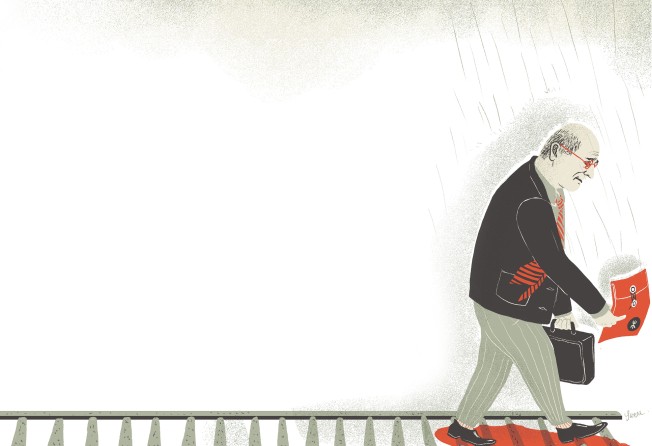At MTR Corp, the buck stops anywhere but the top
Those at the top who don't accept responsibility for what happens on their watch are not doing their job properly, and won't do so in future

It's really simple - if you are going to claim credit for things going well on your watch, you obviously need to accept blame for when things are not going so well.
Moreover, if you are going to be paid far more than people lower down the line, it is only reasonable that you will incur greater risks in performing and keeping your job.
Even the man in the T-shirt running a dai pai dong understands this. That person will be especially sensitive to the notion of risk, because he has his own money at stake and knows that if things go belly up, there will be no point blaming someone else.
You can leverage up this awareness to include practically everyone else who runs a business, with the significant exception of the very grand folk charged with overseeing large public corporations.
There are no prizes for guessing that this is a preamble to some reflections on the fallout from the MTR Corporation's cost overrun and delay scandal, which seems to be doing its best to prove there is irony in the words "high speed" when combined with "rail link".
The overspending at the MTR is running into big numbers and the delay into years, yet when questions were asked, and they were frequently asked about the high-speed rail project, the public was repeatedly assured that everything was on track.
Now we know the truth, and in the fallout Jay Walder, chief executive of the MTR Corp, is being forced out, and Chew Tai-chong, the corporation's former director of projects, has already fallen on his sword.
Chairman Raymond Chien Kuo-fung sees no reason to follow suit, nor do other members of the board, while Anthony Cheung Bing-leung, the policy secretary responsible for this project, has hinted that, if any real evidence of his negligence comes to light, he might go.
A paper-thin "independent" inquiry into this debacle led by Frederick Ma Si-hang, part of the government's insider clique and no stranger to accusations of incompetence during his time in office, conveniently backed up the non-resigners.
The concept of "the buck stops here" seems not to have had an impact on any of these gentlemen.
Instead, almost unbelievably, they are playing the card of ignorance. Ignoring the obvious question of why they never looked more carefully into the progress of this massive project.
The evidence that there were problems seems to have been ignored, and those responsible are keen to blame subordinates for misleading them.
Anyone with experience of running a company knows that the most weasel-like thing a boss can do is to blame subordinates for things going wrong without acknowledging their own supervisory shortcomings.
In smaller businesses, the consequences of bad decisions can be brutal, resulting in considerable loss of money and loss of livelihood. In well-governed public companies, accountability is a given, and there is far less hesitation in ensuring that the bosses are first in line to accept the consequences.
However, in Hong Kong, when it comes to one of the biggest listed companies, where the public retains a majority of the equity, different standards apply.
It is important to understand that taking ultimate responsibility is not merely a matter of revenge or even of punishment but an essential management tool that defines the culture of cohesive corporate entities.
If those at the top will not accept responsibility for what happens on their watch, they are clearly not doing their job and are unlikely to do it properly in the future. If they are secure in the knowledge of limited repercussions for negligence, the incentive to be alert is lacking.
The MTR Corp is emerging as a textbook case of why hybrid public/private companies don't work. On the one hand, most of them, like the MTR, enjoy monopolistic positions in the market. This is enough to encourage complacency, which is further stimulated by the knowledge of a vast cache of other folk's money standing ready to back mega projects of the kind under discussion.
"Normal" companies rarely enjoy market monopolies and most certainly do not have access to the public purse for funding.
The wonderland inhabited by the people at the top of the MTR Corp explains why they seem unaware of their intensely privileged position in the world of commerce. Thus the concept of genuine accountability must be alien to them.
The tragedy is this company employs many highly competent people who run a first-class mass transit system.
However, grafted on top of the professionals who have done such a great job are a motley collection of politically connected appointees and a government eager to initiate fancy and fancier cross-border projects to please its political masters.
Don't hold your breath for lessons to be learned from this debacle.
Stephen Vines runs companies in the food sector and moonlights as a journalist and broadcaster